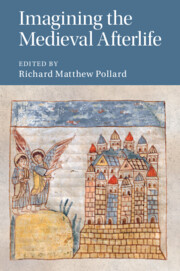Refine search
Actions for selected content:
30 results
Reframing Purgatory: An Issuantist Proposal Grounded in Aeveternity
-
- Journal:
- New Blackfriars ,
- Published online by Cambridge University Press:
- 22 July 2025, pp. 1-15
-
- Article
- Export citation
Chapter Seven - The Afterlife
- from Part II
-
- Book:
- Reforming Art in Renaissance Venice
- Published online:
- 24 January 2025
- Print publication:
- 13 February 2025, pp 324-361
-
- Chapter
- Export citation
Chapter 4 - Purgatory and Pause – Shakespeare, Dante and the Lobster
-
- Book:
- Shakespeare and Beckett
- Published online:
- 19 January 2023
- Print publication:
- 26 January 2023, pp 97-122
-
- Chapter
- Export citation
Chapter 2 - Spiritual Accountancy in the Age of Shakespeare
- from Part I - The Arts of Remembering Death
-
-
- Book:
- Memory and Mortality in Renaissance England
- Published online:
- 06 October 2022
- Print publication:
- 13 October 2022, pp 45-60
-
- Chapter
- Export citation
4 - Purgatory and Purgation
- from Part II - Purgatory
-
- Book:
- Dante the Theologian
- Published online:
- 02 September 2022
- Print publication:
- 22 September 2022, pp 117-158
-
- Chapter
- Export citation
5 - Hope, Memory, and the Earthly Paradise
- from Part II - Purgatory
-
- Book:
- Dante the Theologian
- Published online:
- 02 September 2022
- Print publication:
- 22 September 2022, pp 159-198
-
- Chapter
- Export citation
I.1 - William Caxton, To Know Well To Die (1490)
- from Part I - Preparatory and Dying Arts
-
-
- Book:
- The Death Arts in Renaissance England
- Published online:
- 25 February 2023
- Print publication:
- 08 September 2022, pp 51-128
-
- Chapter
- Export citation
Chapter 11 - ‘Eye Hath not Seen … which Things God Hath Prepared …’: Imagining Heaven and Hell in Romanesque and Gothic Art
- from Part III - Artistic Impressions
-
-
- Book:
- Imagining the Medieval Afterlife
- Published online:
- 07 December 2020
- Print publication:
- 17 December 2020, pp 193-222
-
- Chapter
- Export citation
Chapter 7 - Visions of the Otherworlds in the Late Middle Ages, c. 1300–c. 1500
- from Part I - Chronological Surveys
-
-
- Book:
- Imagining the Medieval Afterlife
- Published online:
- 07 December 2020
- Print publication:
- 17 December 2020, pp 115-130
-
- Chapter
- Export citation
Chapter 14 - The Afterlife in the Visionary Experiences of the Female Mystics
- from Part IV - Notable Authors and Texts
-
-
- Book:
- Imagining the Medieval Afterlife
- Published online:
- 07 December 2020
- Print publication:
- 17 December 2020, pp 264-285
-
- Chapter
- Export citation
Imagining the Medieval Afterlife: Introduction
-
-
- Book:
- Imagining the Medieval Afterlife
- Published online:
- 07 December 2020
- Print publication:
- 17 December 2020, pp 1-6
-
- Chapter
- Export citation
Chapter 9 - The Theology of the Afterlife in the Early Middle Ages, c. 400–c. 1100
- from Part II - Theological Perspectives
-
-
- Book:
- Imagining the Medieval Afterlife
- Published online:
- 07 December 2020
- Print publication:
- 17 December 2020, pp 153-175
-
- Chapter
- Export citation
Chapter 10 - Afterdeath Locations and Return Appearances, from Scripture to Shakespeare
- from Part II - Theological Perspectives
-
-
- Book:
- Imagining the Medieval Afterlife
- Published online:
- 07 December 2020
- Print publication:
- 17 December 2020, pp 176-190
-
- Chapter
- Export citation
Chapter 4 - The Afterlife in the Medieval Celtic-Speaking World
- from Part I - Chronological Surveys
-
-
- Book:
- Imagining the Medieval Afterlife
- Published online:
- 07 December 2020
- Print publication:
- 17 December 2020, pp 62-78
-
- Chapter
- Export citation
Chapter 6 - Otherworld Journeys of the Central Middle Ages
- from Part I - Chronological Surveys
-
-
- Book:
- Imagining the Medieval Afterlife
- Published online:
- 07 December 2020
- Print publication:
- 17 December 2020, pp 99-114
-
- Chapter
- Export citation

Imagining the Medieval Afterlife
-
- Published online:
- 07 December 2020
- Print publication:
- 17 December 2020
Chapter 4 - The Dead
-
- Book:
- The Presence of Rome in Medieval and Early Modern Britain
- Published online:
- 18 September 2020
- Print publication:
- 17 September 2020, pp 172-218
-
- Chapter
- Export citation
8 - Hell in the ‘Sweet Land’
- from Part II - Eastern Mediterranean
-
-
- Book:
- Hell in the Byzantine World
- Published online:
- 02 October 2021
- Print publication:
- 17 September 2020, pp 346-411
-
- Chapter
- Export citation
8 - Hell in the ‘Sweet Land’: Hell’s Place in the Last Judgements of Byzantine and Medieval Cyprus
- from Part II - Eastern Mediterranean
-
-
- Book:
- Hell in the Byzantine World
- Published online:
- 02 October 2021
- Print publication:
- 17 September 2020, pp 346-411
-
- Chapter
- Export citation
Epilogue
-
- Book:
- Music and Musicians at the Collegiate Church of St Omer
- Published online:
- 31 August 2020
- Print publication:
- 17 September 2020, pp 257-276
-
- Chapter
- Export citation
